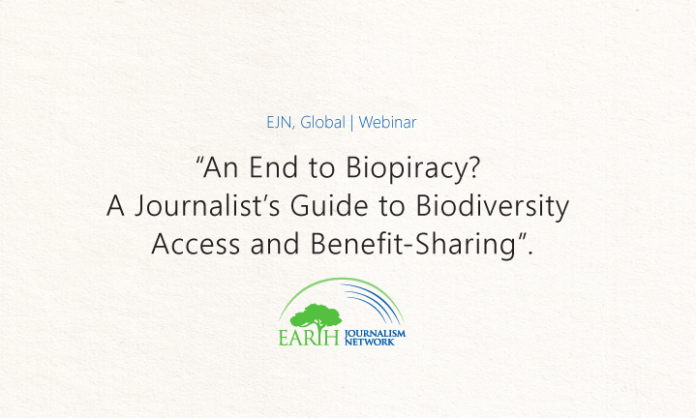Beating the biopirates: A journalist’s guide to biodiversity access and benefit-sharing.
There is a multi-billion-dollar yearly trade in medicines, foodstuffs and industrial products derived from plants, animals, fungi and bacteria. However, many such products have commercialised without any profits returning to the countries and communities whose biodiversity and traditional knowledge made the innovation possible. And in some cases, biological resources have been accessed illegally.
That is why, in 2010, parties to the UN Convention on Biological Diversity (CBD) reached a new agreement — called the Nagoya Protocol — to ensure legal accesses and guarantee that any benefits arising from the use of genetic resources are shared fairly and equitably.
But what exactly is Access and benefit-sharing?
What are countries doing to meet their CBD commitments and ensure that companies meet their legal obligations? Are benefits flowing where they should?
Speakers
Krystyna Swiderska | Principal Researcher, International Institute for Environment and Development
Alejandro Lago | Manager of the UNDP GEF Global ABS Project
Webinar Summary:
This discussion described the impact of the Nagoya Protocol on Access to Genetic Resources and Benefit-Sharing (ABS) and national ABS policies.
Specifically, this legal framework is being used by the private sector, researchers, indigenous peoples, and local communities from 27 countries to develop innovative products to implement the SDGs.
What is Biopiracy?
Biopiracy means the unethical or unlawful appropriation or commercial exploitation of biological materials (such as medicinal plant extracts) that are native to a particular country or territory without providing fair financial compensation to the people or government of that country or territory.
Any case?
Jack Lo Lau, a Peruvian journalist, explained how Chinese Businessmen took maca powder from Peru without permission.
In the early 2000s, what has happened with maca is not China’s fault; it is Peru’s fault for letting their products leave the country and not protecting themselves.
Read More:
Fighting for life: Bangladesh shrimp farmers destitute in wake of the cyclone.
Cyclone Amphan Emergency relief project report.
On the brink of destitution: Covid and climate change push Bangladeshi farmers back into poverty
Shrimp Culture: a chaotic trend of aquaculture in the coastal region of Bangladesh
The aquaculture practice in the southwest coastal area is traditional; however, a rapid expansion of shrimp culture took place at the advent of commercial shrimp cultivating due to higher economic returns.
Shrimp cultivating is one of the few options for the economic development of the coastal region of Bangladesh.
The aquaculture practice in the southwest coastal area is traditional; however, a rapid expansion of shrimp farming took place at the advent of commercial shrimp farming due to higher economic returns.
It is a potential adaptation option for increasing salinity and other environmental stresses. The government has also promoted shrimp as a necessary climate change adaptation option in its national climate policy.
However, extensive shrimp cultivating is more likely to keep ecosystem harmony with dynamic balance by recycling and feedback mechanisms. Therefore, shrimp farming is also being considered a potential adaptation option to increased salinity in this region.
Since the shrimp sector of Bangladesh includes more than 15 million people and the majority are small-scale farmers. However, the government is yet to establish well-structured institutional support to promote sustainable shrimp farming in southwest coastal Bangladesh.
So, this natural and unsystematic shrimp cultivating is gathering impressive discourse because of its negative ecological results.
Read More on Mangrove:
‘Shield the Mangrove’: The effects of mangrove deforestation in Sindh’s coastal regions.
UAE National Environment Day: 200 mangrove seedlings planted in Sharjah sanctuary.
Forest dept identifies 31 wetlands for conservation.
Mangroves and coastal protection: A potential triple-win for Bangladesh
Read More
Climate change: Extreme weather reasons massive losses in 2020.
Coral reefs in danger until a radical decrease in greenhouse-gas emissions.
Climate change could cause 63 million migrants in South Asia by 2050
About Zulker Naeen
Zulker Naeen is a freelance journalist, covers stories of climate change-induced food insecurity, natural calamities, and migration. As a citizen of one of the most climate-vulnerable nations, Zulker focuses his work on climate change. He works with the Climate Tracker to report climate resiliency for vulnerable women and access to climate finance.
He involves in the Climate Tracker South Asia network, which improves the environmental consciousness of youth.
He is also one of the Bangladeshi to win the South Asia Fellowship under Climate Tracker, is a global media network that closely works on Climate Change.










